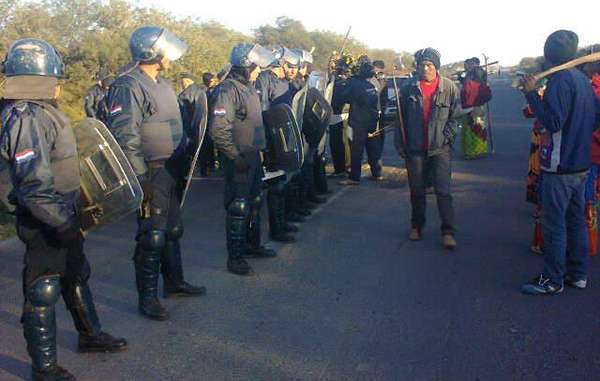
by Deep Green Resistance News Service | Aug 24, 2017 | Biodiversity & Habitat Destruction
Featured image: There have been confrontations between the Ayoreo and the Paraguayan authorities in recent years, as the tribe have protested against the theft and destruction of their land.© GAT/ Survival
by Survival International
Landmark talks between the Paraguayan government and a recently contacted tribe have yet to reach an agreement, allowing rampant deforestation to continue. Some members of the tribe are uncontacted, and live in a rapidly shrinking island of forest.
The talks began six months ago after a petition from the Ayoreo tribe to the Inter-American Commission on Human Rights, an influential body which holds governments in the Americas to account on human rights issues. The Ayoreo have been claiming the right to their ancestral land since 1993.
Halfway through the year-long process, however, and little concrete action has been taken, leading to fears for the tribe’s long-term survival. A technical study is due to be carried out to assess the feasibility of securing the land.
The government has also failed to stop the rapid logging of land owned by the Ayoreo, despite a 2016 emergency order from the Inter-American Commission to protect the uncontacted Indians and halt deforestation.
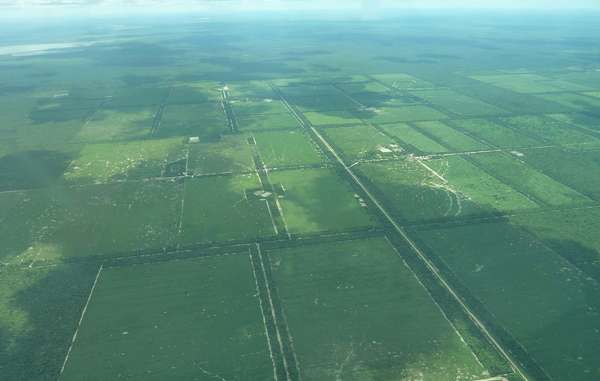
Aerial photograph showing the devastation that logging has brought to Ayoreo land. © Survival
Background briefing
– The Ayoreo live in the Chaco, which is the largest forest in South America outside the Amazon and has recently been recorded as having the highest rate of deforestation in the world. Experts estimate that the forest lost almost 10 million trees in January 2017.
– This poses a deadly threat to the Ayoreo, who face catastrophe unless their land is protected.
– Many members of the Ayoreo tribe were forcibly contacted by missionaries between 1969 and 1986. Continual land invasions forced them to abandon their homes. Many have since suffered from disease, including a TB-like illness, poverty, and exploitation on the fringes of mainstream Paraguayan society.
– Recently contacted members of the tribe spent years fleeing from bulldozers, which they called “beasts with metal skin.” The machines are used by loggers to clear paths for cutting trees.
– The petition which finally brought the Paraguayan government to the negotiating table is called Petition 850-15. It features a claim for the restitution of Ayoreo land.
– In February 2016, the Inter-American Commission issued an emergency order (MC 54-13) calling for the protection of uncontacted Ayoreo and their forests. Although this was in response to a separate petition submitted by the Ayoreo, the orders are to also be discussed during the talks.
– The local support group GAT, and indigenous organization OPIT, have played an important role in lobbying the government, and after months of warning, finally pressed them to investigate the logging in July 2017. It remains to be seen whether the deforestation will be stopped and the perpetrators brought to justice.
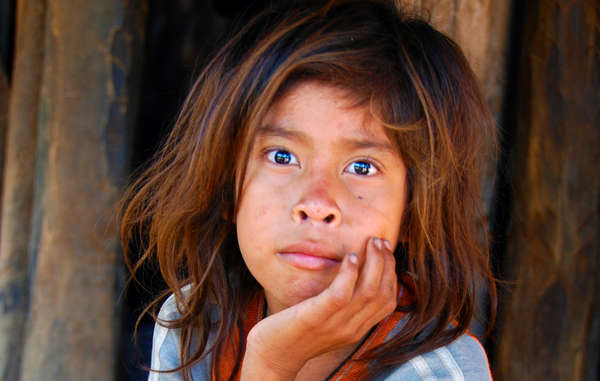
Most of the Ayoreo have been forced out of the forest. They have since been fighting for their land rights. © Survival
Survival International is calling for a complete halt to logging on Ayoreo land, and for the return of all lands which have been titled to ranching companies.
Uncontacted tribes are not backward and primitive relics of a remote past. They are our contemporaries and a vitally important part of humankind’s diversity. Where their rights are respected, they continue to thrive.
They are the best guardians of their environment. And evidence proves that tribal territories are the best barrier to deforestation.
Survival’s Director Stephen Corry said: “The Ayoreo have already been waiting more than twenty years for their lands to be protected. All this time they’ve seen their forests destroyed about them. They hoped the Inter-American Commission’s intervention would finally push the government to act, but that hope too has proved an illusion. Tragically, it seems that Paraguay’s government is so firmly tied to the ranchers and landowners who control the levers of power that nothing short of massive public pressure will move them to act.”
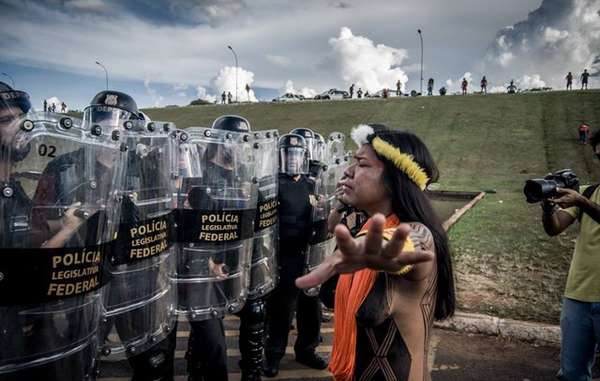
by Deep Green Resistance News Service | Aug 17, 2017 | Lobbying
Featured image: Brazilian Indians have been protesting in Brasilia against the government’s anti-indigenous proposals. © APIB
by Survival International
Indigenous activists and human rights campaigners around the world yesterday celebrated Brazil’s Supreme Court ruling unanimously in favor of indigenous land rights.
In two land rights cases, all eight of the judges present voted for indigenous land rights and against the government of Mato Grosso state, in the Amazon, which was demanding compensation for lands mapped out as indigenous territories decades ago.
Although ruling on one further case was postponed, this outcome has been seen as a significant victory for indigenous land rights in the country.
An international campaign was launched earlier this month after President Temer attempted to have a controversial legal opinion on tribal land recognition adopted as policy.
The proposal stated that indigenous peoples who were not occupying their ancestral lands on October 5, 1988, when the country’s current constitution came into force, would no longer have the right to live there. This new proposal was referred to as the “marco temporal” or “time frame” by activists and legal experts.
If the judges had accepted this, it would have set indigenous rights in the country back decades, and risked destroying dozens of tribes. The theft of tribal land destroys self-sufficient peoples and their diverse ways of life. It causes disease, destitution and suicide.
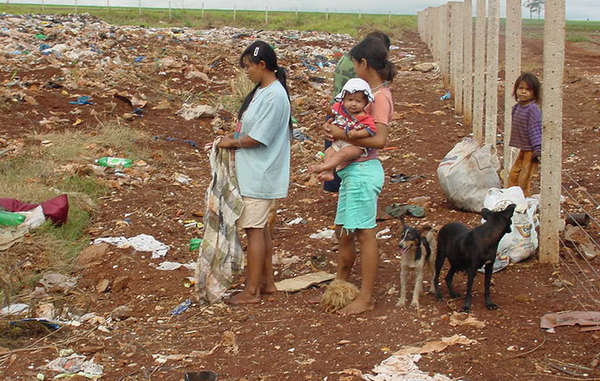
The new policy would have massively undermined the Guarani’s attempts to regain their ancestral land, most of which has been taken over by agribusiness. © Anon/Survival
In response to the ruling, Luiz Henrique Eloy, a Terena Indian lawyer, said: “This is an important victory for the indigenous peoples of these territories. The Supreme Court recognised their original [land] rights and this has national repercussions, because the Supreme Court indicated that it was against the concept of the time frame.”
APIB, Brazil’s pan-indigenous organization, led a protest movement, under the slogan “our history didn’t start in 1988.”
The measure is being opposed by Indians across Brazil. Eliseu Guarani from the Guarani Kaiowá people in the southwest of the country said: “If the time frame is enforced, there will be no more legal recognition of indigenous territories… there is violence, we all face it, attacks by paramilitaries, criminalization, racism.”
Survival International led an international outcry against the proposal, calling on supporters around the globe to petition Brazil’s leaders and high court to reject the opinion. Over 4,000 emails were sent directly to senior judicial figures and other key targets.
While the ruling does not end the possibility of further attacks on tribal land rights in Brazil, it is a significant victory against the country’s notorious agribusiness lobby, who have very close ties to the Temer government.
Survival’s Director Stephen Corry said: “If the judges had accepted this proposal it would have set back indigenous rights in the country by decades. Brazil’s indigenous peoples are already battling a comprehensive assault on their lands and identity – a continuation of the invasion and genocide which characterized the European colonization of the Americas. We’re hugely grateful for the energy and enthusiasm of our supporters in helping the Indians fight back against this disastrous proposal.”
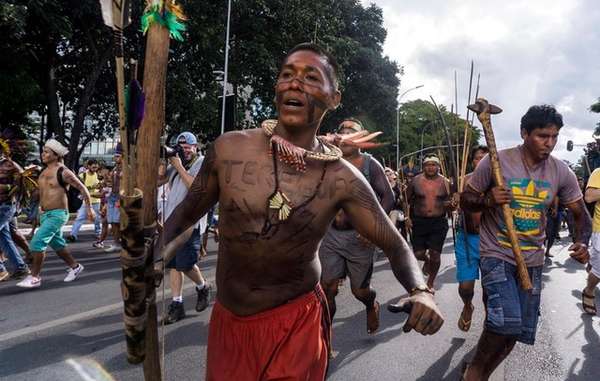
by Deep Green Resistance News Service | Aug 11, 2017 | Colonialism & Conquest
Featured image: Brazil has seen frequent indigenous protests this year, against the anti-Indian policies of President Temer. © Rogerio Assis
by Survival International
Brazil’s Supreme Court will next week deliver a historic judgement on tribal territories which could strike the greatest blow to indigenous land rights since the country’s military dictatorship.
The judgement will be delivered on Wednesday, August 16. Large-scale indigenous protests are anticipated, as the judges decide whether to incorporate a proposal on indigenous land rights drafted by the attorney-general’s office.
The proposal states that indigenous peoples who were not occupying their ancestral lands on or before October 5, 1988, when the country’s current constitution came into force, would no longer have the right to live there.
If the judges accept it, this would set indigenous rights in the country back decades, and risk destroying hundreds of self-sufficient tribes, who depend on their land for autonomy and survival.
Brazil’s pan-indigenous organization APIB: is organizing several events and protests in the capital Brasilia and across the country in the lead up to the ruling, with the slogan: “Our history didn’t start in 1988. No to the time limit.”
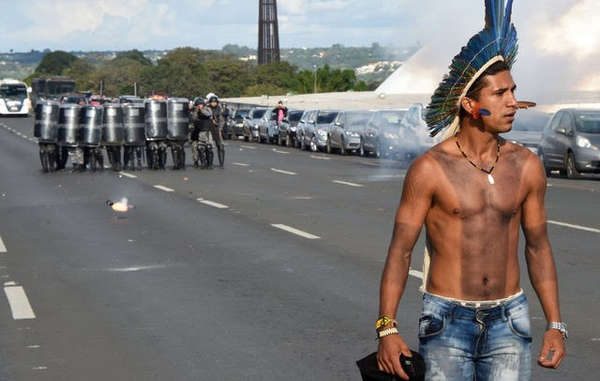
President Temer’s proposed legal opinion has sparked major indigenous protests in Brasilia © Survival
Activists have speculated that the proposal is being pushed by President Temer to secure his political position. His period in office has seen single digit approval ratings, instability, and widespread protest, after the government he leads was installed in April 2016 following the impeachment of former president Dilma Rousseff.
If it becomes policy, this measure would be beneficial to Brazil’s ruralista agribusiness lobby, who regard land protections for indigenous peoples as an unnecessary barrier to profit.
Further details on the judgement here
The Guarani Kaiowá people in southwestern Brazil are just one of the many tribes who would be affected. They will never recover most of their land if this measure is approved.
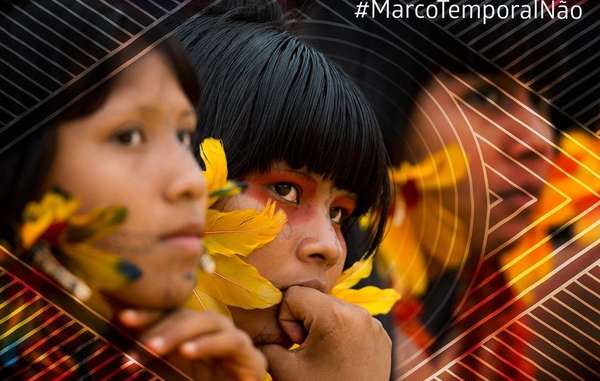
“Our history didn’t start in 1988” – major APIB campaign against the ruling. © APIB
Eliseu Guarani, a spokesman for the tribe, said: “This is very hard for us… there will be no more legal recognition of indigenous territories… there is violence, we all face it, attacks by paramilitaries, criminalization, racism.”
Survival International is actively campaigning against the measure, which is illegal under international law, and has urged its supporters to take action.
Survival’s Director Stephen Corry said: “Land theft is the biggest problem that tribal people face, and this proposal is little more than a land grabber’s manifesto. It’s a blatant shredding of tribal land rights, selling them out to ranchers, loggers, soy barons and other vested interests.”
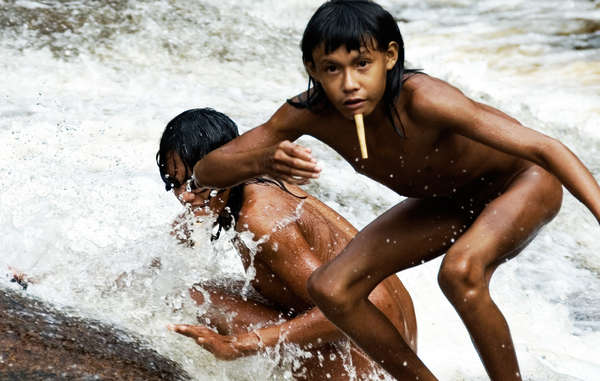
by Deep Green Resistance News Service | Jul 14, 2017 | Colonialism & Conquest
Featured image: The Zo’é are a very isolated tribe, who were forcibly contacted in the 1980s. Many of them died of diseases to which they had no resistance. © Fiona Watson/Survival International
by Survival International
29 indigenous organizations from across South America have come together in Brazil to slam governments for failing to protect the lives and lands of uncontacted tribes – a situation they say is tantamount to genocide.
Representatives from tribes in Brazil, Peru, Colombia, Paraguay, and Venezuela, attended the large conference hosted by the Brazilian organization CTI in June 2017.
The conference condemned the “exponential increase” in violence against indigenous people across the continent and described failures to properly protect the territory of uncontacted tribal peoples as genocide.
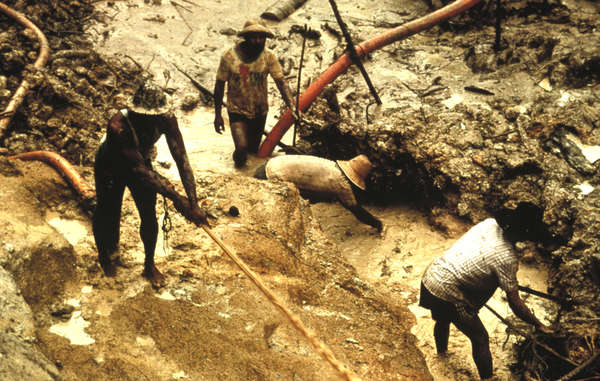
Gold miners devastated the Yanomami between the 1980s and 1990s, and still present a genocidal threat to uncontacted members of the tribe. © Colin Jones/Survival
Brazil has recently been under fire for cuts to its indigenous affairs agency, FUNAI. These cuts, especially those affecting teams of agents who protect uncontacted tribal territories, leave uncontacted peoples dangerously exposed to violence from outsiders, and diseases like flu and measles to which they have no resistance.
The country is unusual in having had two genocide convictions in its courts: both for crimes against indigenous peoples. The UN genocide convention was signed 69 years ago in December 1948.
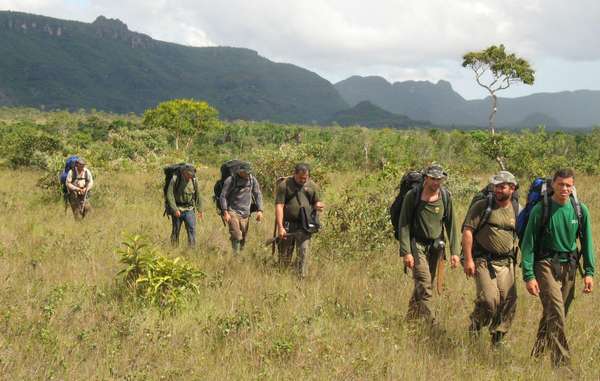
FUNAI agents on a patrol. Teams like this are vital to protecting indigenous territories, but their funding is being cut by the Brazilian government. © FUNAI
A Brazilan senator is proposing a new bill in Brazil’s congress which would designate all unauthorized entry into uncontacted tribes’ lands as a breach of the country’s “genocide law” – aimed at protecting uncontacted peoples. However, campaigners fear that the current government’s close ties to the corrupt agribusiness lobby could hinder efforts to create more robust protections.
The senator, Jorge Viana, is from Acre state, which is home to many uncontacted tribes, and also people like the Sapanawa, who were forced to make first contact in 2014.
All uncontacted tribal peoples face catastrophe unless their land is protected. Survival International is committed to securing their land for them, and giving them the chance to determine their own futures.
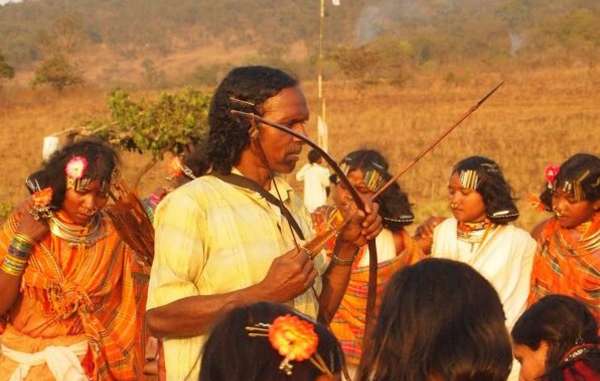
by Deep Green Resistance News Service | Jun 28, 2017 | Colonialism & Conquest
Featured image: Bari Pidikaka, Dongria activist, who died in police custody after being detained in 2015. © Survival International
by Survival International
A leader of a tribe in India, which made headlines around the world when it won a David and Goliath battle against a British mining corporation, has died in police custody – following a violent police campaign of harassment and intimidation against activists.
Bari Pidikaka of the Dongria Kondh tribe was arrested and detained on his way back from a protest in October 2015, and died this week.
The Dongria from central India report systematic “intimidation, abduction and wrongful incarceration” of their leaders by state police, who they claim are acting to “further the interests” of Vedanta Resources, a British-based mining company.
Local police also arrested Kuni Sikaka, a 20-year-old Dongria activist and relative of the two most prominent Dongria leaders. She was dragged out of her house at midnight, despite the fact that police had no warrant.
She was then paraded in front of officials and local media as a “surrendered Maoist [member of an armed resistance group]” despite there being no evidence to support this.
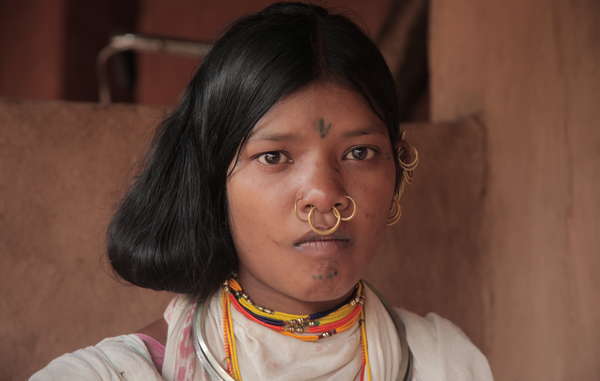
Kuni Sikaka has been arrested and paraded in front of the media. She is an activist and a relative of two prominent Dongria leaders. © Video Republic
Other members of the tribe have also faced brutal harassment. Activist Dasuru Kadraka has been detained without trial for over 12 months. Dongria have been beaten, and tortured with electric wires to force them to stop campaigning for their rights.
With the support of local officials, Vedanta has previously attempted to pressure the tribe into allowing bauxite mining on their ancestral land in the Niyamgiri Hills. In a historic referendum in 2013, the tribe unanimously rejected the proposal.
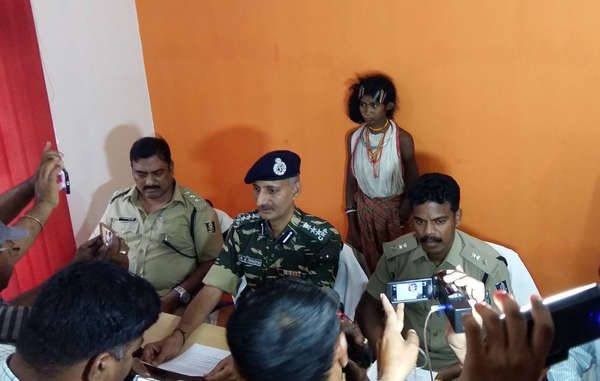
Since resisting Vedanta’s plan to mine their land, many Dongria, including Drimbilli (pictured here) and Kuni, are being systematically arrested and accused of being Maoist guerrillas. © Video Republic
But the Dongria fear that, as long as Vedanta operates its refinery at the foot of the hills, the threat of mining remains. Those detained claim that police demanded that they stop protesting against the mine.
In an open letter to the President of India, over 100 independent Indian organizations said: “In the last 2-3 years, several Dongria Kondh youth and elders have been arrested, harassed, and killed, and one has committed suicide after repeated harassment and alleged torture by security forces. In none of these cases have [officials] been able to produce evidence linking them to so-called Maoists.”
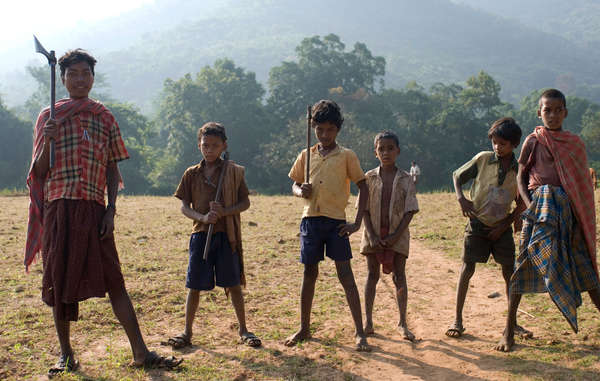
Vedanta Resources continues to operate a refinery close to the Dongria’s hills, raising concerns that they have not yet abandoned their ambitions for mining in the area. © Survival
Dasuru Kadraka said: “I was arrested and taken to the superintendent of police’s office. There I was tortured with my hands tied and electric wires attached to my ears and electric shock given to me, to force me to surrender… and to make me leave the Save Niyamgiri movement. But I refused… The movement is my life, I will never stop protecting the Niyamgiri hills and forests.”
The Dongria Kondh’s right to their ancestral land has been recognized in Indian and international law. Survival International led the global campaign to protect their land, and will continue to fight for the Dongria to be allowed to determine their own futures without harassment.
Survival’s Director Stephen Corry said: “It’s now clear that there’s a brutal campaign to harass, intimidate and even murder the Dongria Kondh, to weaken their resistance to the exploitation of their land. But the Dongria are absolutely determined to protect the Hills, which not only provide them with food, housing and clothing, but are also the foundation of their identity and sense of belonging.”















